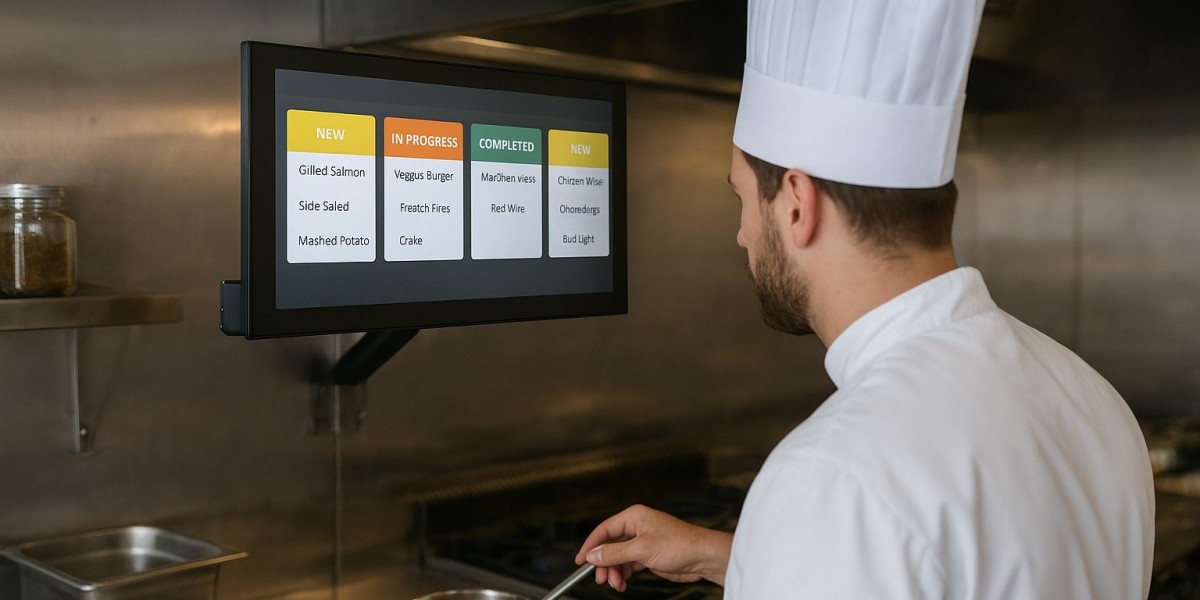How to Set Up a Kitchen Display System for Restaurants
Running a restaurant is all about efficiency, speed, and accuracy. One of the best tools to streamline your operations is a Kitchen Display System (KDS). Instead of relying on paper tickets or handwritten notes, a KDS uses a digital display to manage orders in real-time. This not only improves communication between the front-of-house and kitchen staff but also enhances customer satisfaction.
In this blog, we’ll explain what a Kitchen Display System is, its benefits, and how you can set one up step by step.
What Is a Kitchen Display System (KDS)?
A Kitchen Display System is a digital screen that replaces traditional paper tickets in restaurant kitchens. It receives orders directly from the Point of Sale (POS) system, displaying them instantly for the chefs and staff to prepare.
Unlike printed tickets, a KDS reduces errors, saves paper, and helps manage workflows more efficiently.
Explore our range of POS Displays that can be used for KDS setups.
Benefits of Using a Kitchen Display System
Faster Order Processing
Orders appear on the screen instantly, so there’s no delay between the server entering the order and the kitchen receiving it.
Improved Accuracy
Since orders go directly from the POS system to the kitchen display, the chances of human error are greatly reduced.
Better Staff Communication
KDS connects the front-of-house staff with the kitchen team, ensuring everyone is on the same page.
Eco-Friendly Operations
By eliminating paper tickets, restaurants save money on paper rolls and contribute to sustainability.
Complete your POS setup with POS Printers and Barcode Scanners.
Step-by-Step Guide to Setting Up a Kitchen Display System
Step 1 – Choose the Right Hardware
Start with a POS Display or touchscreen monitor designed for busy kitchen environments.
Browse POS Displays.
Step 2 – Integrate With POS Software
Ensure the display connects with your existing restaurant POS software. Most modern POS systems support KDS integration.
Step 3 – Connect Peripheral Devices
Your KDS should be part of a complete POS setup that may include Receipt Printers for customer receipts and Cash Drawers for payment management.
Step 4 – Configure for Kitchen Workflow
Customize the display layout based on your restaurant’s needs. For example, separate screens for grill, fryer, and drinks can help divide tasks more effectively.
Step 5 – Train Your Staff
Even the best systems need proper training. Show your staff how to read, clear, and manage orders on the display.
Best Practices for Managing a Kitchen Display System
Use Clear Visibility: Ensure screens are large and bright enough for busy kitchen conditions.
Color-Coding: Highlight new, pending, and completed orders with color codes for easy tracking.
Durable Hardware: Invest in sturdy POS displays that can withstand heat, steam, and spills.
Maintenance: Regularly check and replace Consumables for printers if used alongside the KDS.
Why Buy Kitchen Display Systems from LoyaltySensePOS?
At LoyaltySensePOS, we specialize in high-quality POS hardware that makes restaurant operations smooth and reliable.
Wide range of POS Displays
Reliable Receipt Printers
Strong and durable Cash Drawers
Trusted customer support and fast shipping
Whether you’re upgrading or setting up a KDS for the first time, LoyaltySensePOS has the right hardware for your restaurant.
FAQs About Kitchen Display Systems
Q1: Can I replace paper tickets with a KDS?
Yes. A KDS completely removes the need for paper tickets, making your restaurant more efficient and eco-friendly.
Q2: Does a KDS work with all POS systems?
Most modern POS software integrates smoothly with digital kitchen displays.
Q3: Do I still need a receipt printer with a KDS?
Yes. While the KDS helps your staff, you’ll still need a POS Printer for customer receipts.
Q4: Is a KDS suitable for small restaurants?
Absolutely. Even small kitchens benefit from faster, more accurate, and eco-friendly order management.
Final Thoughts
A Kitchen Display System is an essential tool for modern restaurants. It reduces mistakes, speeds up order processing, and enhances communication between staff. By setting up the right hardware and integrating it with your POS, you’ll deliver a smoother dining experience for your customers.








